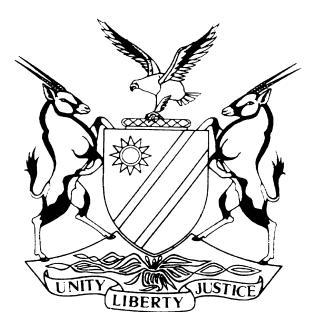NOT REPORTABLE

HIGH COURT OF NAMIBIA MAIN DIVISION, WINDHOEK
RULING
Case no: I 62/2016
In the matter between:
DAPHNE SWANEPOEL
T/A DAPHNE SWANEPOEL PROPERTIES 1ST APPLICANT
DIETER MUELLER 2ND APPLICANT
and
SHINYA INVESTMENTS CC 1ST RESPONDENT
LOUIS FOURIE 2ND RESPONDENT
THOMAS ARNOLD EHBRECHT 3RD RESPONDENT
JEAN-PIERRE RAMBERT 4TH RESPONDENT
SECRET SPRINGS LTD 5TH RESPONDENT
Neutral citation: Mueller v Shinya Investments CC & 6 Others (I62/2016) [2017] NAHCMD 232 (18 August 2017)
Coram: MILLER AJ
Heard: 11 AUGUST 2017
Delivered: 18 AUGUST 2017

ORDER

Having heard both counsel for the applicants and first, fourth and fifth respondents –
IT IS ORDERED THAT:
The application is dismissed.
The applicants are ordered to jointly or severally pay the costs of the respondents who opposed the application which will include the costs of one instructing and one instructed counsel.
In so far as it may be necessary I order that Rule 32(11) shall not apply in the taxation of the bills of costs.
There shall be a status hearing on Monday, 28 August 2017 at 14h00.

RULING

MILLER AJ:
[1] The matter before me is an application in terms of which essentially the first applicant seeks an order to the effect that she be joined as a plaintiff in case I 62/2016 (the main action).
[2] The main action was instituted by the second applicant against various defendants and at this stage has had a chequered history. What is important is that the second applicant seeks to recover from the remaining defendants the sum of N$600 000.00 together with value added tax. This amount, so it is alleged, became due and payable to him as an agreed commission, consequent open him being the effective cause of the sale of certain immovable property, in terms of a sole mandate granted to him.
[3] The present application was launched on 22 May 2017 and became opposed by the first, fourth and fifth respondents. They were content to raise certain points of law only and filed no affidavits.
[4] The founding affidavit annexed to the Notice of Motion in the present application was deposed to by the first applicant. The affidavit is terse to the point and in some respects contradictory and at odds with itself as to the facts upon which the first applicant seeks to rely.
[5] I do not intend to dwell on that to any extent. Mr Heathcote SC who moved the application on behalf of the applicants conceded during the course of the hearing that the application standing by itself would not pass muster. I agree with that concession and can only add that the facts in so far as one can rely on them fall far short of what was required in order to succeed.
[6] Mr Heathcote SC urged me to go beyond what appears from the application itself and to also have regard to the pleadings exchanged between the parties in the main action. He submitted that I should do so because the respondents referred to the pleadings in their papers.
[7] What I am urged to do is to wade through the pleadings on my own in the hope of finding something that may or may not advance the applicants’ case despite the fact that the applicants do not refer to them. Apart from the fact that such an approach is unappetizing, it is flawed in any event.
[8] In the matter of Nelumbu and Others v Hikumwah and Others1, Damaseb, DCJ stated the following:
‘As the adage goes, in motion proceedings you stand or fall by your papers.
[42] When reliance is placed on material contained in annexures, the affidavits must clearly state what portions in the accompanying annexures the deponent relies on. It is not sufficient merely to attach supporting documents and to expect the opponent and the court to draw conclusions from them. In that regard, practitioners will do their clients a great service by heeding the following warning by Cloete JA in Minister of Land Affairs and Agriculture v D & F Wevell Trust:
“It is not proper for a party in motion proceedings to base an argument on passages in documents which have been annexed to the papers when the conclusions sought to be drawn from such passages have not been canvassed in the affidavits. The reason is manifest – the other party may well be prejudiced because evidence may have been available to it to refute the new case on the facts. . . . A party cannot be expected to trawl through lengthy annexures to the opponent’s affidavit and to speculate on the possible relevance of facts therein contained. Trial by ambush is not permitted”.’
[9] The reasoning applies, with equal, if not greater force, to the case before me where no attempt was even made to refer to the pleadings in the affidavit deposed to, let alone to attempt to draw attention to the parts therein that the deponent considered relevant to advance her cause.
[10] The application remains flawed beyond redemption and stands to be dismissed.
[11] The following order will consequently issue:
The application is dismissed.
The applicants are ordered to jointly or severally pay the costs of the respondents who opposed the application which will include the costs of one instructing and one instructed counsel.
In so far as it may be necessary I order that Rule 32(11) shall not apply in the taxation of the bills of costs.
There shall be a status hearing on Monday, 28 August 2017 at 14h00.
---------------------
K Miller
Acting Judge
APPEARANCES
APPLICANT: Mr Heathcote SC
Instructed by Philip Swanepoel Legal Practitioners, Windhoek
RESPONDENTS: Mr Obbes
Instructed by Koep & Partners, Windhoek
1 (SA 27/2015)[2017] NASC (13 April 2017).